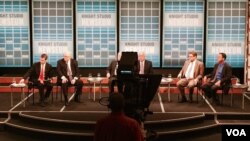The invention of the smart phone in the early 21st century triggered the era of citizen journalism, revealing the complex relationship between a citizen’s right to expression versus the police’s duty to protect, said a panel of law enforcement experts earlier this month.
The group of law enforcement officers, civil rights activists, and academics discussed the issue of police power, speech and privacy rights in a live VOA broadcast at the Newseum in Washington last month.
Ordinary citizens participate in gathering the news through snapping a photo or video on their smart phone daily thanks to the rise of mobile devices, said panelist Jay Stanley of the American Civil Liberties Union. Often, the videos of officers displaying force while on duty have gone viral, molding the public’s perception of law enforcement in the Unites States, said Stanley.
In one such example, a recent video of a Texas police officer treating primarily African American youths with excessive force at a pool party caused quite a stir in the press, sparking individuals and activist groups to call for legal action.
“Unfortunately there have been a lot of police abuses that are taking place, and sometimes they are not just individual bad apples but entire teams covering up for each other,” said Stanley. “What we are seeing right now is a power struggle,” he added.
However, the former Chief of the U.S. Capitol Police, Terrance Gainer, does not think the problem is widespread. He said there are tens of thousands of police interactions with civilians and a very small percentage of them show excessive force.
Tuscon Chief of Police Roberto Villaseñor said he has implemented an experimental body camera program within his department to heighten police oversight on day to day civilian interactions. Villaseñor and other panelists raised privacy concerns for both law enforcement and civilians with implementation of police body cams.
Jonathan Smith of the UDC Davis A. Clark School of Law addressed potential civilian legal issues when he said, “how do you deal with the collateral consequences of privacy when dealing with the victims of domestic violence and sexual assault and other crimes.”
Panelists agreed that police body camera programs are a step in the right direction, but other factors, such as race and privacy, need to be addressed.








